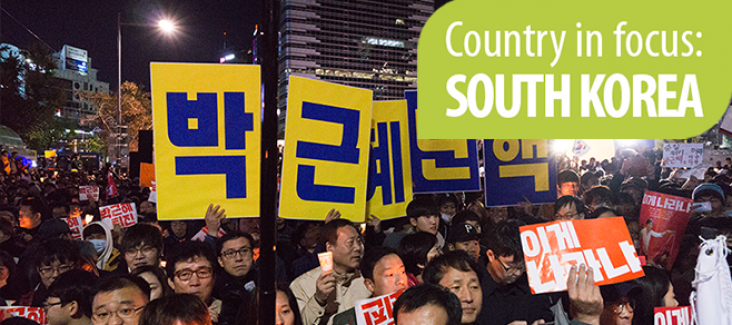The past years have been turbulent for the South Korea - the democratic revolution of 2017 opened a Pandora’s box of forgotten, often hidden, scars of Korean democratization, epitomized by the release of the movie ‘1987’, that deals with the deaths of two activists during the 1987 “June Struggle” protests. The contrast between the 1987 protests, where people braved teargas, violent repression and even death, and the 2017 candlelight rallies, with its festive and cultural feel, couldn’t be bigger. It lays bare the generational gap between those who grew up before 1987 and those who grew up after. The incredible difference between both revolutions is a testament to the rapid process of Korean democratization. The 1980’s fight for direct presidential elections, instead of the obscure and autocratic process of indirect election that was in place before, kickstarted Korean democracy.
The circumstances of that struggle were brought to the collective mind last year, by the movie ‘1987’, which had over 5 million viewers. The tragic deaths of two innocent university students, Park and Lee, heavily marked the protests. Park died while being tortured by the police, under the guise of ‘defending national security’. Lee was hit by a teargas grenade during a students’ demonstration against the regime’s torture practices. These shameful deaths of two young people triggered the protesters’ rage and led them to defy fear and security defense walls. Their outrage ultimately led to the amendment that introduced the ‘direct election’ of the president in the Korean constitution.
The 2017 candlelight demonstrations have been able to benefit from two major improvements in the political landscape as a result of the earlier struggle; nonviolence and rule of law. The protest took the form of a festival; the people sang, danced, spoke, and marched holding candles. The very fact that people were able to participate without being afraid was a cultural shock to people who grew up before 1987, while it was self-evident to the post-1987 generation. People’s participation proved itself to be an added value to the functioning of our democratic institutions. The Korean people demanded the impeachment of former president Park, accusing her of arbitrary exercise of her political power, and their demands were implemented by the constitutional court, another offshoot of Korean democratization, at the parliament’s request. The people’s will was accepted by the representational body. In 30 years, we have gone from enforcing voting rights to enforcing impeachment; showing that the people’s will to participate and intervene has evolved as well.
Now we are hopeful that modern direct democracy in is in the process of institutionalization as well. The current government has demonstrated political willingness to introduce a form of citizens’ initiatives, where initiatives that gather the support of at least 200,000 people require a mandatory response of the government. But the power to change the 1987 constitution is still exclusively in the hands of the parliament and government, and the introduction of initiative and referendum rights therefore depends on them. For now, the momentum is not yet strong enough. And Koreans are sometimes reluctant to accept the idea of referendums, because of the memories of the plebiscites held by the military dictators.
At the same time our democracy is now so strong that even a North Korean missile threat could not permit a military take-over in the name of national security anymore. Instead we are awaiting the PyeongChang Olympic Winter Games, when athletes from across Korea will participate under one common flag. It is our message to the world: “We will find the way. We always have.”

